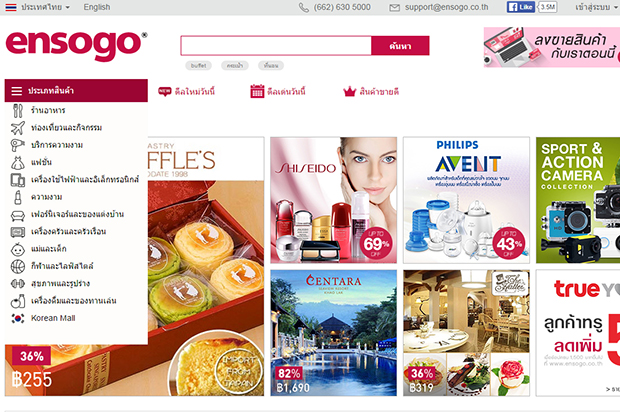
Important lessons can be learned from the shutdown of Ensogo's Southeast Asian operation, say leading e-commerce companies and experts.
Ensogo's abrupt closure is threatening to damage consumer confidence in buying or selling products online.
The web retailer last week announced it was shutting down all six of its business units in the region including the one in Thailand, leaving many customers unsure where they stand.
Surangkana Wayuparb, executive director of the Electronic Transactions Development Agency, said Ensogo's closure was likely to erode consumer trust in e-commerce and shake online merchant confidence.
"We will soon discuss with Ensogo's executives about how the company will address the problem for its customers in Thailand left stranded with unredeemable coupons," she said.
The agency has received 10 complaints from Ensogo customers.
Dhiraphol Suwanprateep, a partner at Baker & McKenzie law firm, said there is no law in Thailand to protect online vendors and called for the government to implement e-commerce legislation and regulation to encourage companies to conduct business online in the digital age.
Michael Cluzel, chief executive and co-founder of Eatigo, the Bangkok-based online restaurant-booking service, said the Ensogo case would remind other e-commerce operators to focus on profitability ruthlessly. They must have a clear path to break even or they are doomed.
Moreover, e-commerce operators need to manage merchant and consumer anxieties better by communication to reduce chaos and worries for all concerned.
Mr Cluzel said consumers should not trust the voucher business model as when a firm closes down it will always get ugly.
The best way to protect oneself is to stay clear of prepaid vouchers and use services that give the same discounts but without prepayment such as Eatigo for restaurants or Golfdig for golf discounts.
Mr Cluzel said the Ensogo case was not an e-commerce problem but a specific problem of prepaid vouchers. Users can protect themselves by insisting on cash on delivery.
Martin Toft Sorensen, chief executive and co-founder of WearYouWant, a fashion and beauty e-commerce platform in Bangkok, said Ensogo's case was very rare and involved a company that had existed for many years with no malicious intentions.
The e-commerce industry is growing rapidly globally. Recent reports suggest Thai e-commerce market volume will reach close to US$6 billion in 2020, double the 2016 forecast. This growth is set to continue as consumer get more online savvy.
"We will see other players facing challenges and consolidations within the different verticals, but the growth of e-commerce is here to stay," said Mr Sorensen.
He said credit card payments usually give consumers the option of stopping transactions if they notice something is wrong. They can also use cash on delivery or look for trust marks on websites. For merchants, shorter payment periods have a reduced risk, he said.
Santit Jirawongkraisorn, managing director of Lalamove, a Hong Kong-based delivery-matching mobile application, said it was generally known in the industry that sellers using Ensogo had complained of late payments.
Ensogo's closure was announced abruptly without providing a clear redemption plan, worrying customers.
"If the operator is irresponsible, the only redemption channel might be through legal means," said Mr Santit.